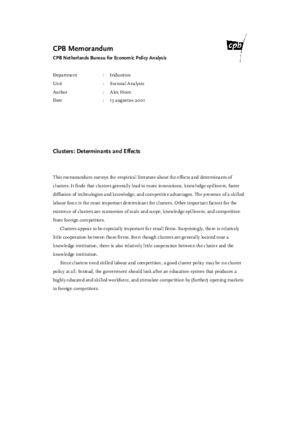Clusters: Determinants and Effects
The presence of a skilled labour force is the most important determinant for clusters. Other important factors for the existence of clusters are economies of scale and scope, knowledge spillovers, and competition from foreign competitors. Clusters appear to be especially important for small firms.
Surprisingly, there is relatively little cooperation between these firms. Even though clusters are generally located near a knowledge institution, there is also relatively little cooperation between the cluster and the knowledge institution. Since clusters need skilled labour and competition, a good cluster policy may be no cluster policy at all. Instead, the government should look after an education system that produces a highly educated and skilled workforce, and stimulate competition by (further) opening markets to foreign competitors.
